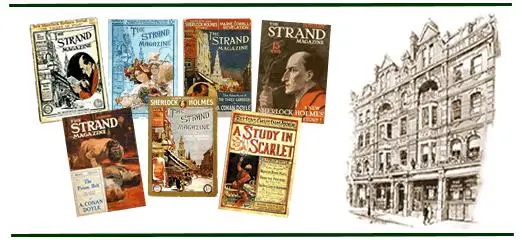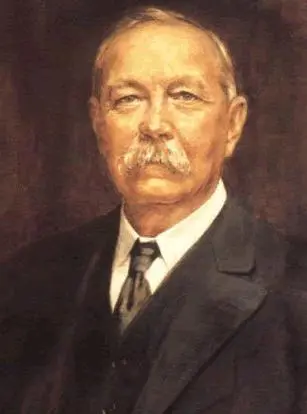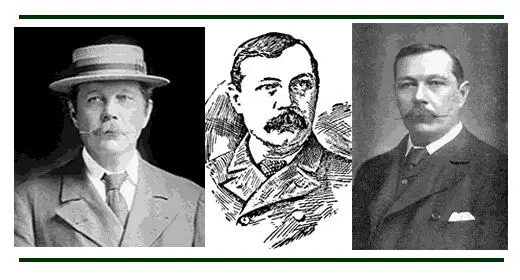A typical issue might feature illustrated articles of scientific and historical interest, a series of humorous cartoons on a theme, pictures of famous people at different ages (from toddler to adult), interviews with celebrities, a treatment of a controversial issue of the day, and one or more pieces of fiction. The factual articles were not too complex, and the fiction tended to feature a mystery or "twist" to keep the reader interested. Nevertheless, the articles were skillfully edited and stylishly presented in a sophisticated format. Whoever bought a copy of The Strand felt like a true Londoner.

Conan Doyle wanted fame and success as a writer, and he went about achieving it more systematically and shrewdly than he had approached his medical career. First, he hired a literary agent, A. P. Watt, the very first man to advertise that sort of service. Then, he thought long and hard about what might appeal to his audience. Fearing that serialized stories would be of limited use to a reader who missed an issue, Conan Doyle decided to write stories that could be read independently but whose central character would be the same. Sherlock Holmes, who had already been the hero of Conan Doyle's novels A Study in Scarlet and Sign of the Four, seemed like a good candidate for such a series. Conan Doyle's agent submitted "A Scandal in Bohemia" to The Strand. It was accepted, and Conan Doyle was contracted to write a total of six stories featuring his detective.
Because of the very small success achieved by his first two Holmes novels, Conan Doyle's expectations were low. When "A Scandal in Bohemia" appeared in July 1891, during The Strand Magazine's first year, it was an instant hit. In assuring his own future, Conan Doyle also assured the grand success of The Strand, which ran monthly until 1950.
Arthur Conan Doyle
Like the elusive Sherlock Holmes, his most famous creation, Sir Arthur Conan Doyle was a man of many contradictions. Scientifically educated, he believed in séances and fairies. An advocate for more equitable divorce laws, he believed that women should be denied the vote. A humanist who identified with oppressed peoples, he staunchly defended English colonialism at its most aggressive. He dreamed of being a serious historical novelist, yet he is best remembered for stories that he considered pot-boilers. The product of a pragmatic, fiercely protective mother and a detached dreamer of a father, Conan Doyle became a man with astonishing self-confidence, a tireless self-promoter who also retained some measure of childish innocence throughout his life.

Arthur Conan Doyle's humble beginnings did not predict his future success. Born on May 22, 1859, to a middle-class, Catholic family, he grew up on Edinburgh's rough-and-tumble streets, far from his successful grandfather and uncles, who hobnobbed with London's intellectual elite. His celebrated grandfather, John Doyle, had reinvented the art of political caricature. John Doyle's eldest son, also named John, became a well-known caricaturist himself, and the second son, Richard, began his career as a successful cartoonist for Punch (an early magazine devoted to political satire) and ended it as a famous book illustrator. Two other sons were also successful in different fields.

Arthur's parents, Mary Foley Doyle and Charles Altamont Doyle, had moved to Scotland from London, hoping that Charles could advance his career in architecture. Having inherited some measure of his family's artistic talent, Charles began with every hope of success, but never realized his dreams. Plagued by depression and alcoholism, Charles was a distant father and husband, becoming so detached from reality that he ended life in an asylum. With considerable charity, his son Arthur later said of him, "My father's life was full of the tragedy of unfulfilled powers and of underdeveloped gifts."
As the only active parent, Mary Doyle had a strong influence on Arthur, the eldest surviving son of seven children, instilling in him a love of chivalric romances and a firm belief in the English code of honor. She made the boy memorize and recite his family's genealogy, ancestor by ancestor. When left to himself, Arthur loved to read American "wild west" adventure stories, especially those of Bret Harte and Thomas Mayne Reid, an Irish immigrant to the U.S.
1 comment